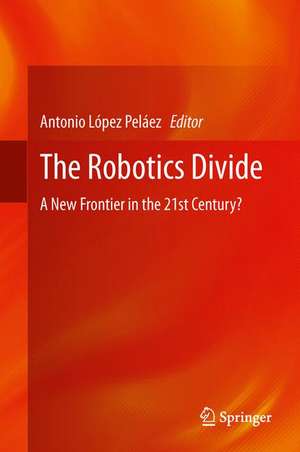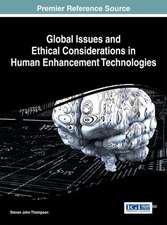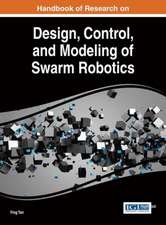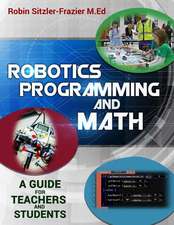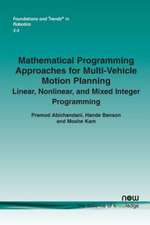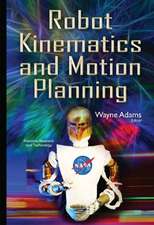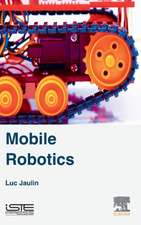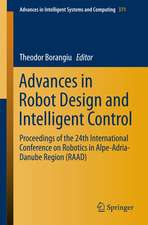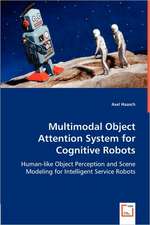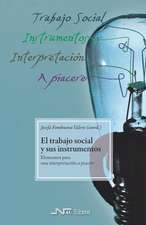The Robotics Divide: A New Frontier in the 21st Century?
Editat de Antonio López Peláezen Limba Engleză Hardback – 22 aug 2013
The Robotics Divide analyzes how robotics will shape our societies in the twenty-first century; a time when industrial and service robotics, particularly for military and aerospace purposes, will become an essential technology. The book, written by experts in the field, focuses on the main technological trends in the field of robotics, and the impact that robotics will have on different facets of social life. By doing so, the authors aim to open the “black box” of a technology which, like any other, is designed, implemented and evaluated according to the economic and cultural patterns of a cosmopolitan society, as well as its relations of power.
The Robotics Divide explores future developments in robotics technology and discusses the model of technological development and the implementation of robotics in this competitive market economy. Then the authors examine to what extent it is possible to determine the characteristic features of the robotic divide, namely in what ways the robotic divide differs from the digital divide, and how a model to integrate this technology can be developed without reproducing patterns of inequality and power that have characterized the advent of previous technologies.
These issues - inequality, robotics and power - are of concern to robotics and advanced automation engineers, social scientists, economists and science policy experts alike.
| Toate formatele și edițiile | Preț | Express |
|---|---|---|
| Paperback (1) | 637.13 lei 6-8 săpt. | |
| SPRINGER LONDON – 28 aug 2015 | 637.13 lei 6-8 săpt. | |
| Hardback (1) | 643.34 lei 6-8 săpt. | |
| SPRINGER LONDON – 22 aug 2013 | 643.34 lei 6-8 săpt. |
Preț: 643.34 lei
Preț vechi: 756.86 lei
-15% Nou
Puncte Express: 965
Preț estimativ în valută:
123.12€ • 128.06$ • 101.64£
123.12€ • 128.06$ • 101.64£
Carte tipărită la comandă
Livrare economică 14-28 aprilie
Preluare comenzi: 021 569.72.76
Specificații
ISBN-13: 9781447153573
ISBN-10: 144715357X
Pagini: 248
Ilustrații: VI, 221 p.
Dimensiuni: 155 x 235 x 20 mm
Greutate: 0.5 kg
Ediția:2014
Editura: SPRINGER LONDON
Colecția Springer
Locul publicării:London, United Kingdom
ISBN-10: 144715357X
Pagini: 248
Ilustrații: VI, 221 p.
Dimensiuni: 155 x 235 x 20 mm
Greutate: 0.5 kg
Ediția:2014
Editura: SPRINGER LONDON
Colecția Springer
Locul publicării:London, United Kingdom
Public țintă
ResearchCuprins
21st-century Robotics: From the Factory to the Private Realm.- Perspectives on Industrial Robotics.- Perspectives on Service Robotics.- Military and Aerospace Robotics.- Robotics and Social Stratification.- Public Opinion and Technology Assessment: Perspectives on Advanced Robotics.- The Robotics Divide: Lessons from the Digital Divide.- Dependency, Social Work and Advanced Automation.- Inequalities in the Information Society: From the Digital Divide to Digital Inequality.- Prospective Techno economic Analysis for the Post-crisis World.- Economics, Robotics and Power.- Social Interaction and On-line and Off-line Robotics: Perspectives on Web Robots.- The Robotics Divide: Characteristics, Trends and Scenarios in the 21st Century.
Notă biografică
Antonio López Peláez holds a PhD in Philosophy and Sociology. He is a Full Professor of Social Work and Social Services at the Department of Social Work of the Faculty of Law at the UNED, the largest public university in Spain. His research interests include the analysis of social trends, methods of social intervention, and the intersections of new technologies and social work. He has been a visiting scholar at the School of Social Welfare of the University of California at Berkeley (USA), Universität Potsdam (Germany), the Department of Social Work at Universidad de Sonora (Hermosillo, Mexico) and the Universidad Americana (Managua, Nicaragua).
In 2001, he received the award for excellence in doctoral research for his Ph.D. in Sociology. In 2008, his article (with D. Kyriakou) “Robots, Genes and Bytes: Technology Development and Social Changes Towards the Year 2020” was named one of the Top 25 Hottest Articles in Technological Forecasting and Social Change. His most recent publications in the field of Futures Studies include López Peláez, A, Segado Sánchez-Cabezudo S, Kyriakou D (2012) Railway transport liberalization in the European Union: Freight, labour and health towards the year 2020 in Spain. Technological Forecasting and Social Change 79: 1388-1398; González de la Fe, T, López Peláez, A (eds) (2011) Innovación, conocimiento científico y cambio social (Innovation, scientific knowledge and social change). Madrid: Centro de Investigaciones Sociológicas; López Peláez A., Segado Sánchez-Cabezudo S (2010) Liberalization Policies or Degradation Policies? The Spanish Railway Case. Revista Internacional de Sociología (RIS) 68: 757-773; López Peláez,, A, Kyriakou, D (2009) Technological Development and Social Change: Towards new implicit social contract. Pp. 27-42. In Stroud, B H, Corbin, S E (eds) Handbook on Social Change. New York: Nova Science Publishers; and López Peláez A (2009) Prospective and Social Change: How to DirectResearch and innovation Policies in Technologically Advanced Societies. Arbor. Ciencia, Pensamiento y Cultura 738: 825-836.
In 2001, he received the award for excellence in doctoral research for his Ph.D. in Sociology. In 2008, his article (with D. Kyriakou) “Robots, Genes and Bytes: Technology Development and Social Changes Towards the Year 2020” was named one of the Top 25 Hottest Articles in Technological Forecasting and Social Change. His most recent publications in the field of Futures Studies include López Peláez, A, Segado Sánchez-Cabezudo S, Kyriakou D (2012) Railway transport liberalization in the European Union: Freight, labour and health towards the year 2020 in Spain. Technological Forecasting and Social Change 79: 1388-1398; González de la Fe, T, López Peláez, A (eds) (2011) Innovación, conocimiento científico y cambio social (Innovation, scientific knowledge and social change). Madrid: Centro de Investigaciones Sociológicas; López Peláez A., Segado Sánchez-Cabezudo S (2010) Liberalization Policies or Degradation Policies? The Spanish Railway Case. Revista Internacional de Sociología (RIS) 68: 757-773; López Peláez,, A, Kyriakou, D (2009) Technological Development and Social Change: Towards new implicit social contract. Pp. 27-42. In Stroud, B H, Corbin, S E (eds) Handbook on Social Change. New York: Nova Science Publishers; and López Peláez A (2009) Prospective and Social Change: How to DirectResearch and innovation Policies in Technologically Advanced Societies. Arbor. Ciencia, Pensamiento y Cultura 738: 825-836.
Textul de pe ultima copertă
Societies survive in their environment and compete with each other depending on the technology they develop. Economic, military and political power are directly related to the available technology, while access to technology is key to the well-being of our societies at the individual, community and national level.
The Robotics Divide analyzes how robotics will shape our societies in the twenty-first century; a time when industrial and service robotics, particularly for military and aerospace purposes, will become an essential technology. The book, written by experts in the field, focuses on the main technological trends in the field of robotics, and the impact that robotics will have on different facets of social life. By doing so, the authors aim to open the “black box” of a technology which, like any other, is designed, implemented and evaluated according to the economic and cultural patterns of a cosmopolitan society, as well as its relations of power.
The Robotics Divide explores future developments in robotics technology and discusses the model of technological development and the implementation of robotics in this competitive market economy. Then the authors examine to what extent it is possible to determine the characteristic features of the robotic divide, namely in what ways the robotic divide differs from the digital divide, and how a model to integrate this technology can be developed without reproducing patterns of inequality and power that have characterized the advent of previous technologies.
These issues - inequality, robotics and power - are of concern to robotics and advanced automation engineers, social scientists, economists and science policy experts alike.
The Robotics Divide analyzes how robotics will shape our societies in the twenty-first century; a time when industrial and service robotics, particularly for military and aerospace purposes, will become an essential technology. The book, written by experts in the field, focuses on the main technological trends in the field of robotics, and the impact that robotics will have on different facets of social life. By doing so, the authors aim to open the “black box” of a technology which, like any other, is designed, implemented and evaluated according to the economic and cultural patterns of a cosmopolitan society, as well as its relations of power.
The Robotics Divide explores future developments in robotics technology and discusses the model of technological development and the implementation of robotics in this competitive market economy. Then the authors examine to what extent it is possible to determine the characteristic features of the robotic divide, namely in what ways the robotic divide differs from the digital divide, and how a model to integrate this technology can be developed without reproducing patterns of inequality and power that have characterized the advent of previous technologies.
These issues - inequality, robotics and power - are of concern to robotics and advanced automation engineers, social scientists, economists and science policy experts alike.
Caracteristici
Analyzes how robotics will shape our societies in the twenty-first century; a time when industrial and service robotics, particularly for military and aerospace purposes, will become an essential technology Examines an emerging divide: the “robotics divide”; a phenomenon linked to the model to integrate advanced robotics in economic, social and military spheres Focuses on the main technological trends in the field of robotics, and the impact that robotics will have on different facets of social life Includes supplementary material: sn.pub/extras
